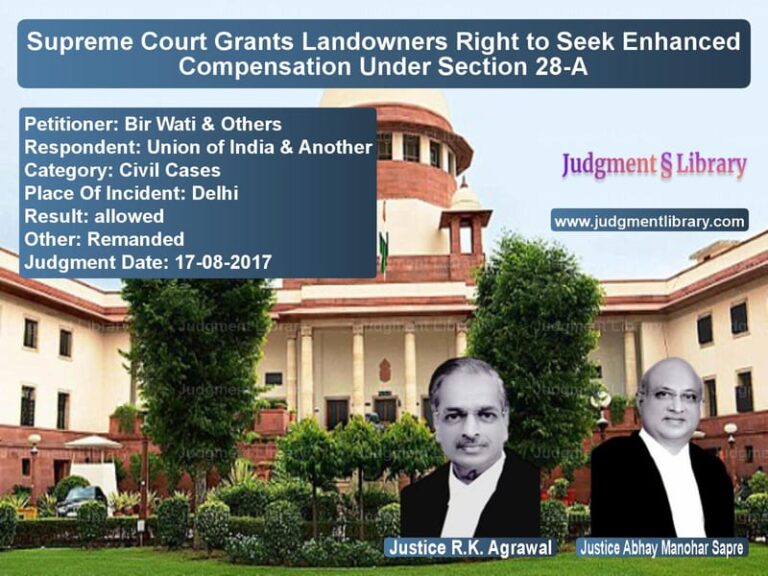Suspension of Sarpanch Under Rajasthan Panchayati Raj Act: Supreme Court’s Ruling in Sardar Meena Case
The case of Sardar Meena vs. The State of Rajasthan & Ors. presents an important legal question regarding the suspension of a Sarpanch under the Rajasthan Panchayati Raj Act, 1994. The appellant, Sardar Meena, was suspended from his position as Sarpanch of Gola ka Bas following criminal allegations against him. The Supreme Court was tasked with determining whether the suspension was legally justified and if it should continue indefinitely.
Background of the Case
On May 12, 2021, an FIR was registered against Sardar Meena, alleging that he, along with 8-10 associates, engaged in armed trespass and indiscriminate firing with the intention of committing robbery, loot, and even murder. The complainant, Ravi Kumar Meena, suffered injuries from the incident. Following the FIR, the police arrested the appellant, but he was later granted bail by the High Court.
Upon receiving information about the FIR, the Development Officer of Panchayat Samiti, Rajgarh, sought a report on the matter. The Chief Executive Officer, District Parishad, Alwar, forwarded the reports to the Rural Development and Panchayati Raj Department. Subsequently, a preliminary inquiry was initiated under Section 38(1) of the Rajasthan Panchayati Raj Act, 1994, and a charge sheet was issued against the appellant on June 16, 2021. As a result, he was suspended pending the completion of the inquiry.
Legal Provisions on Suspension of a Sarpanch
The case revolved around the interpretation of Section 38 of the Rajasthan Panchayati Raj Act, which governs the removal and suspension of elected Panchayati Raj officials. The relevant portion states:
“(1) The State Government may, by order in writing and after giving an opportunity of being heard and making such inquiry as may be deemed necessary, remove from office any member, including a Chairperson or a Deputy Chairperson of a Panchayati Raj Institution, who:
- Refuses to act or becomes incapable of acting as such; or
- Is guilty of misconduct in the discharge of duties or any disgraceful conduct.”
Further, Sub-section (4) allows the State Government to suspend a Panchayati Raj official:
“(4) The State Government may suspend any member, including a Chairperson or a Deputy Chairperson of a Panchayati Raj Institution, against whom:
- An inquiry has been initiated under Sub-section (1); or
- Any criminal proceedings in regard to an offense involving moral turpitude is pending trial in a Court of law.”
Petitioner’s Arguments
The counsel for the appellant argued that the FIR was politically motivated. He pointed out that:
- The complainant was the son of a political opponent who had lost the election to the appellant.
- The appellant had already been granted bail by the High Court, suggesting that the case against him was weak.
- The suspension was imposed solely based on the criminal proceedings, which should not be grounds for removal.
- His continued suspension would deprive him of the ability to complete his elected tenure.
Respondent’s Arguments
The State of Rajasthan defended the suspension, arguing that:
- The appellant was accused of serious criminal acts involving moral turpitude, justifying his suspension.
- A preliminary inquiry had already found a prima facie case of “disgraceful conduct.”
- The order of suspension was not solely based on the FIR but also on an independent inquiry by the authorities.
Supreme Court’s Analysis and Judgment
The Supreme Court recognized that political rivalry could be a factor in such cases, but it clarified that the suspension should not continue indefinitely. The Court stated:
“The own stand of the respondent is that the action is based on the enquiry held by the concerned officer in pursuance to the FIR. The sequitur would be that the proceedings in the criminal case would not weigh at this stage in determining the conduct of the appellant but would be dependent on the material presented before the competent authority against the appellant.”
The Court emphasized that the suspension cannot continue indefinitely without resolution. It directed that:
- The inquiry against the appellant must be completed by April 30, 2022.
- The appellant’s suspension would continue only until April 30, 2022, and must be reviewed thereafter.
- The authorities must prove the charges against the appellant independently of the FIR.
Significance of the Judgment
This ruling is significant because it sets limits on the prolonged suspension of elected officials without a final determination of their misconduct. It clarifies that:
- A suspension must be based on an independent inquiry, not merely an FIR.
- Suspensions cannot continue indefinitely, especially in cases of political rivalry.
- The inquiry process must be completed within a reasonable time to ensure fairness.
Conclusion
The Supreme Court’s decision in this case underscores the balance between preventing misconduct in public office and protecting elected representatives from politically motivated suspensions. The ruling ensures that elected officials cannot be indefinitely removed from their positions without a fair and timely inquiry.
With this verdict, the Court has set a precedent that will likely guide future cases involving the suspension of elected officials under the Panchayati Raj system in India.
Petitioner Name: Sardar Meena.Respondent Name: The State of Rajasthan & Ors..Judgment By: Justice Sanjay Kishan Kaul, Justice M.M. Sundresh.Place Of Incident: Rajasthan.Judgment Date: 22-02-2022.
Don’t miss out on the full details! Download the complete judgment in PDF format below and gain valuable insights instantly!
Download Judgment: sardar-meena-vs-the-state-of-rajasth-supreme-court-of-india-judgment-dated-22-02-2022.pdf
Directly Download Judgment: Directly download this Judgment
See all petitions in Fundamental Rights
See all petitions in Constitution Interpretation
See all petitions in Legislative Powers
See all petitions in Public Interest Litigation
See all petitions in Judgment by Sanjay Kishan Kaul
See all petitions in Judgment by M.M. Sundresh
See all petitions in allowed
See all petitions in supreme court of India judgments February 2022
See all petitions in 2022 judgments
See all posts in Constitutional Cases Category
See all allowed petitions in Constitutional Cases Category
See all Dismissed petitions in Constitutional Cases Category
See all partially allowed petitions in Constitutional Cases Category






